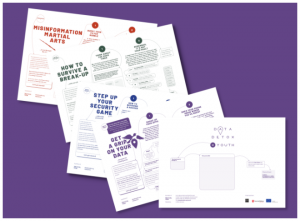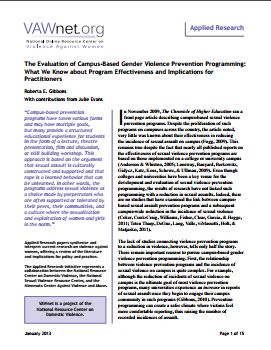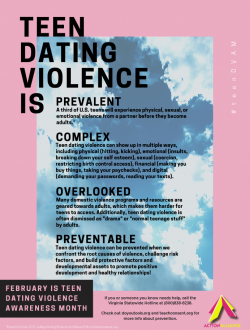Resources Library: Brochures
Start a Search:
Building Healthy Futures - Prevention education flyers
The Building Healthy Futures Fund (BHFF) was created to establish a statewide revenue source for local Sexual & Domestic Violence Agencies to implement evidence-informed prevention programming to disrupt the root causes of sexual and intimate partner violence.
These educational flyers were created to assist and support parents and other caring adults in young people's lives with approaching conversations about consent, sexuality, and gender expression and identity. Discussions about these topics are critical to a young person's healthy relationships, identity development, and lifelong well-being. Establishing a safer space to talk through what can be tough topics can open the door for them to ask a trusted adult about more difficult situations such as harm and abuse. We encourage you to explore the resources shared on each flyer or contact us at the Action Alliance if you would like to learn more!
If you would like to support the Building Healthy Futures Fund you can purchase a Peace Begins at Home license plate, Virginia’s only license plate to help fund prevention of sexual and domestic violence, here: bit.ly/peacebeginsathome.
Data Detox x Youth

Data Detox x Youth is an activity book to help young people take control of their tech. This interactive toolkit encourages young people to think about different aspects of their digital lives, from their social media profiles to their passwords, with simple activities for reflection and play.
The activity book contains four sections:
- Digital Privacy, which focuses on reducing data traces and understanding online profiling;
- Digital Security, with tips on creating strong and secure passwords;
- Digital Wellbeing, which deals with the addictive nature of smartphones;
- and finally Misinformation, a guide for consuming and sharing information online.
The toolkit is designed for 11 to 16-year-olds who already have their own devices, but it can be used by people of all ages. All you need is a smartphone or a tablet, a printer and something to write with.
Places where the Data Detox x Youth could be used:
- In a classroom (or virtual classroom)
- At home
- By youth groups and organisations (e.g. in a workshop)
Also available in العربية (Arabic), Basque, Brazilian Português, Čeština (Czech), Deutsch, Español, Ελληνικά (Greek), Italiano, Nederlands, Norsk, Português and Shan.
Evaluation of Campus Based Gender Violence Prevention Programming from VAWnet

Colleges and universities have been a key venue for the development and evaluation of sexual violence prevention programming. However, there are no studies demonstrating a link between campus-based sexual assault prevention programs and a subsequent campus-wide reduction in the incidence of sexual violence (Coker, Cook-Craig, Williams, Fisher, Clear, Garcia, & Hegge, 2011; Teten Tharp, DeGue, Lang, Valle, Massetti, Holt, & Matjasko, 2011).
Nevertheless, there remain important reasons to pursue campus-based gender violence prevention programming:
- Prevention programming can create a safer climate where victims feel more comfortable reporting, actually raising the number of recorded incidences of assault.
- Using a decrease in the incidence of sexual assault as the only measure of success for prevention programs ignores many other short- and intermediate-term goals that are conceptually linked to a reduction in sexual assault, such as increasing students knowledge about rape and changing attitudes related to rape so that students are less likely to blame victims (Anderson & Whiston, 2005; Lonsway, Banyard, Berkowitz, Gidycz, Katz, Koss, Schewe, & Ullman, 2009).
- Research shows that a significant number of woman experience sexual violence while in college (Fisher, Cullen, & Turner, 2000; Koss, Gidycz, & Wisniewski, 1987; Krebs, Lindquist, Warner, Fisher, & Martin, 2007; Black et. al., 2011).
February is Teen Dating Violence Awareness Month

February is Teen Dating Violence Awareness month. This poster outlines some common misconceptions about teen dating violence as well as offering some action items toward preventing it. For more information, see doyoutools.org and teachconsent.org.
Forced Marriage is Abuse
The Universal Declaration of Human Rights (Article 16) states that “marriage shall be entered into only with the free and full consent of the intending spouses.” As such, forced marriage is a clear violation of human rights.
The tactics used to force someone into marriage or to punish him or her for leaving a forced marriage are also human rights violations. The life of someone forced into marriage may consist of daily abuses, including rape, forced labor, domestic violence, and deprivation of the right to education, which can result in severe and long-term harm, including deteriorating medical and mental health.
The Tahirih Justice Institute's www.preventforcedmarriage.org website is an incredibly useful tool that serves as a resource library for service providers and includes over 10 recorded webinars on different topics related to providing services to forced marriage survivors and individuals at risk, as well as research papers, including the 2011 survey study on "Forced Marriage in Immigrant Communities in the United States", recommended books, and a news archive.
Also, check out the Forced Marriage 101 Webinar and the attached brochure and fact sheet to learn more about how forced marriage impacts individuals in the United States.

